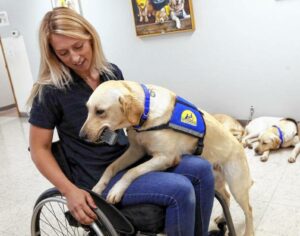Animals uplift our lives in various ways from their cute faces to their unforgettable personalities. Animals work to dry up our tears on bad days and make our laughter even louder on good days. Some dogs are even trained to perform specific tasks for individuals with disabilities. These specific tasks include but are not limited to alerting to low sugar levels, seizure alert and protection, PTSD management, Autism Assistance, tethering and tracking, etc. When dogs are trained to perform these tasks they are given the title of certified “Service Dog”. Oftentimes, people loosely use the term “service dog”, which should not be confused with the term “emotional support animal”. These titles are often used interchangeably even though they mean two completely different things. So what’s really the difference between these two titles?
“Service Animal”
A Service Animal is defined as an animal that is individually trained to do work or perform tasks for an individual with a disability including physical, sensory, intellectual, and/or mental disabilities. Service Animals are permitted by law to go in all areas that students, members of the public, and other participants in services, programs or activities are allowed to go, as long as they are with their

person/handler. Businesses by law are not allowed to prohibit service animals from being with their person/handler. The only kind of animals that can be service animals for public accommodations and public services are dogs and miniature horses. This is under the Americans with Disabilities Act (ADA), Titles II and III which protects people who live with disabilities and who use service animals in the U.S. federally (ADA, servicedogs.com).
“Emotional Support Animal”
Emotional Support Animals or ESAs provide relief to individuals with “psychiatric or mental disabilities” through companionship. Emotional Support animals can be any type of pet and are not  recognized as service animals under the Americans with Disabilities Act (ADA). ESAs generally have to be registered by providing a certified letter from a doctor explaining said individuals need for their animal’s companionship. ESAs are not trained to perform a task or tasks for their person. Registered ESAs generally are only granted the right to be housed with their person. Meaning, if housing does not allow animals, but an individual has a registered ESA, their housing cannot deny their ESA access to live with them.
recognized as service animals under the Americans with Disabilities Act (ADA). ESAs generally have to be registered by providing a certified letter from a doctor explaining said individuals need for their animal’s companionship. ESAs are not trained to perform a task or tasks for their person. Registered ESAs generally are only granted the right to be housed with their person. Meaning, if housing does not allow animals, but an individual has a registered ESA, their housing cannot deny their ESA access to live with them.
Dangers of Loosely Using Both Terms
It is becoming far too common for the terms Service Dogs and ESAs to be used interchangeably. Many people are ignorant to the above definitions of each term, and may not know that they could be causing damage to individuals who actually need and have certified Service Dogs. Below are some examples of the dangers caused by people not respecting what each term truly means:
- There are a number of people who abuse the system because they want to be able to take their dog everywhere with them. But what is the big deal? The big deal is that untrained dogs with fake certifications or vests act out in public settings when exposed to all of the sights, sounds and obstacles involved with having your dog in public. Service dogs are specifically trained for years, from the time of being a puppy, to be able to focus on their task when in public. Having an untrained “fake” service dog in a public setting can distract the Service Dog from being able to perform its tasks for its individual. There are even numerous instances where “fake” service dogs have shown aggressive behavior toward Service Dogs while in public or even toward people in public.
- Air travel has been another focal point on the Service Dog vs. ESA issue. While the ADA only considers dogs and miniature horses as Service Animals, air carriers created the Air Carrier Access Act of 1986. This federal law allows free travel for “any animal” trained to assist a person with a disability or that provides emotional support. There are no guidelines to determine whether an animal can actually provide emotional support. Since, airlines have reported numerous issues with untrained animals causing disturbances during flights. This poses a danger to all the passengers, other actual trained Service Dogs on the flight and the flight’s crew. The Department of Transportation (DOT) has since asked that there are more restrictions placed for animals on board flights.
- Individuals with trained Service Dogs, often are left to deal with the repercussions of “fake service dogs” entering businesses. As this issue continues to arise, more restaurants and places of business find themselves questioning the integrity of those who really need service dogs. That places someone who has a disability in a very uncomfortable position of having to “prove it” which should never be the case.
How to Obtain a Certified Service Dog
There are many organizations available to individuals who are in need of a trained Service Dog. That is the best route to take, as the training and placement of the dog is typically done by professional dog trainers. The process itself can be lengthy and expensive, but most organizations provide several resources to help individuals overcome this obstacle. Most of the organizations placing Service Dogs, breed the dogs they place to ensure a good genetic lineage and healthy dog. These dogs are then “in-training” from the time they are puppies until they are about 1-2 years old. They then go through a series of task training sessions and public training tests before becoming certified and placed with their individual. Individuals are typically expected to wait this long (about 2 years) before they receive their Service Dog. While waiting, organizations will then help with fundraising to raise the money for the dog, which can be in the thousands. While every organization’s process varies, this is a general idea of what to expect. Below are several local organizations in Ohio that help with service dog placement:
- 4 Paws for Ability – Xenia, OH https://www.4pawsforability.org/
- Assistance Dogs for Achieving Independence – Sylvania, OH https://abilitycenter.org/assistance-dogs/
- W.A.G.S 4 Kids – Berea, OH https://www.wags4kids.org/
How to Register your Pet as an Emotional Support Animal
While there is no formal registration database for registering an Emotional Support Animal, people need to be careful of scams. Any requested need for accommodations for an ESA must come from a certified letter from a certified mental health professional. There are many websites that promote “ESA certification letters” for a price of “x, y or z”. These websites are the scams that need to be watched for. If you are truly an individual with a need for an ESA, you should be seeing a professional therapist or doctor, not going online for a letter. Many certified mental health professionals are open to the idea of animals providing companionship for their clients, however they do not respect the way the system tends to be abused. Most professionals will write this letter for their regularly seen clients. So, if you feel as though you are someone who would qualify for an ESA, we urge you to make an appointment to see a mental health professional.
In Conclusion
ESAs and Service Animals can both work to uplift the lives of individuals in many ways. However, Service Animals are trained for specific tasks to help individuals with disabilities. ESAs on the other hand, are specifically used for emotional support and companionship. ESAs are not task trained. Service Animals are protected under the American with Disabilities Act and granted public access while ESAs are not. Nineteen states have passed laws that criminalize passing off pets as service animals. And a Senate Bill was passed last February to reduce ESA fraud by making it a criminal act to falsely claim having a disability in order to have an animal in their apartment or dorm. All the controversy is unfortunate as ESAs truly make a world of difference for those who need them. Though it’s tempting to certify a pet in order to gain access to places that would not normally welcome them, there are unintended consequences that affect others (Modern Dog Magazine).




